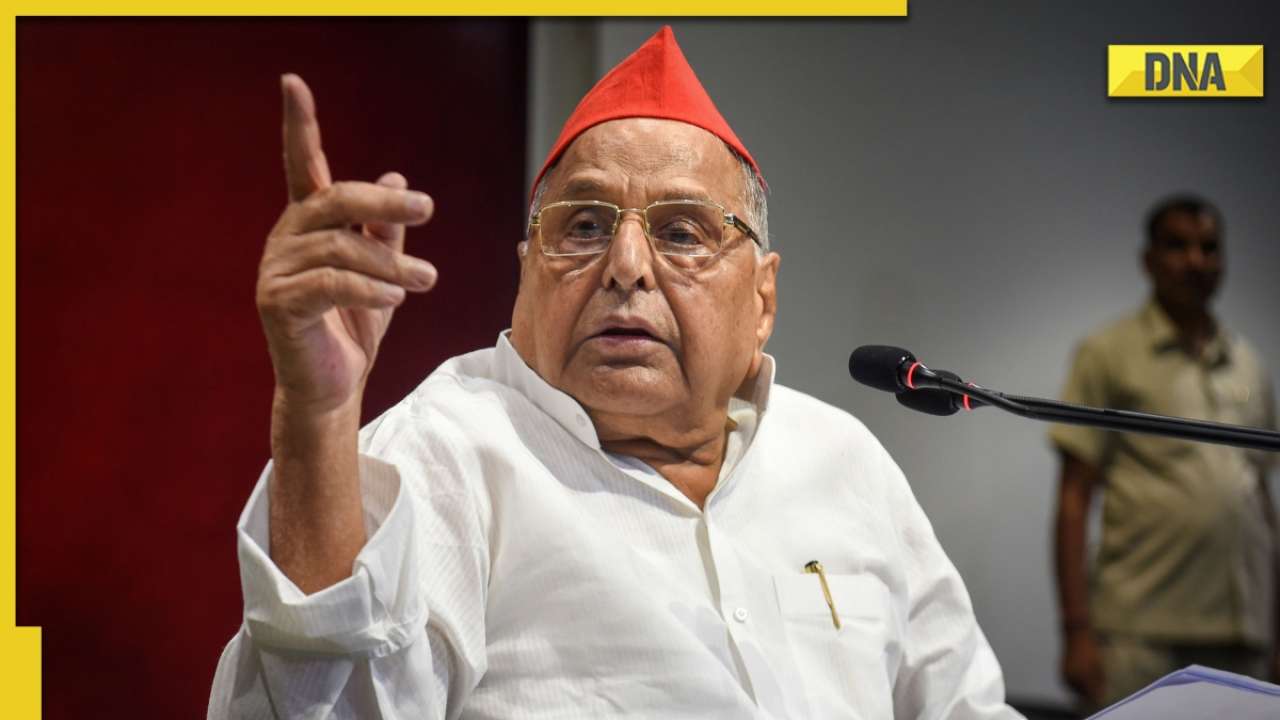
Samajwadi Party founder and veteran socialist Mulayam Singh Yadav was laid to rest today at his native Saifai village in Etawah district of Uttar Pradesh. The last rites took place as a sea of people chanting “Netaji amar rahein” who queued up for the final darshan amid the drizzle.
Earlier His mortal remains were brought to Saifai Monday evening and kept at his 'kothi' where people poured in to pay their last respects to "Netaji", as Yadav was fondly called. Yadav's body was moved around 10 am Tuesday from the house to a bigger hall on the Mela Ground premises, around one km away, to allow people to pay their last respects.
Senior Congress leaders Mallikarjun Kharge and Pramod Tiwari, Telugu Desam Party chief N Chandrababu Naidu, and BJP leader Rita Bahuguna Joshi were among the leaders who attended the last rites at the Saifai Mela Ground pandal to pay their last respects to the 82-year-old.
Yadav's son and Samajwadi Party chief Akhilesh Yadav, Defence Minister Rajnath Singh, Bihar Deputy CM Tejashwi Yadav and PSP chief Shivpal Yadav were also present.
Samajwadi Party leader Dharmendra Yadav could not hold back his tears as he stood near the socialist leader's coffin.
Yadav, a three-time Uttar Pradesh Chief Minister who spawned the state's most prominent political clan and played a key role on the national stage, died Monday after prolonged illness. The former defence minister was admitted to Gurugram's Medanta Hospital in August and shifted to its Intensive Care Unit on October 2.
Highlights of MSY's political career
Born on November 22, 1939 into a farming family, Yadav was elected an MLA 10 times and an MP, mostly from Mainpuri and Azamgarh, seven times.
He was defence minister from 1996 to 1998 in H D Deve Gowda's United Front government, and became chief minister thrice, in 1989-91, 1993-95, and 2003-07.
For decades, he enjoyed the stature of a national leader but Uttar Pradesh largely remained the 'akhara' where Yadav played out his politics, beginning as a teenager influenced by socialist leader Lohia.
For party workers, even when he was no longer the SP president, the patriarch who famously trained as a wrestler in his younger days, remained ?Netaji?, the leader. And his presence on the scene provided the glue that held the Yadav clan together, at least to a degree.
A 'socialist', Yadav was open to possibilities in politics. Thanks often to mergers and splits, he had been affiliated with a series of parties -- Lohia's Sanyukt Socialist Party, Charan Singh's Bharatiya Kranti Dal, Bharatiya Lok Dal and Samajwadi Janata Party.
He founded his own SP in 1992. Yadav struck deals with the Bahujan Samaj Party, the Bharatiya Janata Party and the Congress whenever needed to form or save the governments led by him in Uttar Pradesh.
In 2019, Netaji sprang a surprise by praising Modi in Parliament, wishing that he would return as prime minister after the next election. This, when his party saw Modi's BJP as its main rival in Uttar Pradesh. The remark baffled analysts.
Just as another comment, back in 2014 at a rally, triggered outrage when he spoke against the death sentence for rapists, saying "boys make mistakes". And then, there was his advocacy of the idea that India, Pakistan and Bangladesh should form a confederation.
During his second term as MLA, Indira Gandhi declared Emergency and Yadav was sent to jail, like many opposition leaders.
Yadav was leader of Opposition in the UP Legislative Council and then in the state assembly, before becoming the chief minister for the first time in 1989 with the BJP extending outside support to his Janata Dal government.
When the saffron party withdrew support over the Babri Masjid-Ram Janmabhoomi issue in 1990, the Congress kept his government afloat for some months. In November 1993, Yadav again headed a government in Uttar Pradesh, supported by the BSP. It collapsed when the ally pulled the rug.
The SP leader then moved to the national stage, being elected to the Lok Sabha in 1996 from Mainpuri.
As opposition parties tried to form a non-BJP alternative to the Congress, Yadav briefly appeared to be in the fray for the prime minister's post but ended up becoming the defence minister. In 2003, he became Uttar Pradesh chief minister for the third time after the collapse of a short-lived BSP-BJP coalition government.
The SP was again in a position to form the Uttar Pradesh government in 2012. But the senior Yadav stepped aside so that his son Akhilesh could become the state's youngest CM at 38.
The squabbling in the party and the family led to a coup of sorts by Akhilesh Yadav in 2017. In the final years of his life, the ailing patriarch played a diminishing role in the affairs of the party that he had founded.